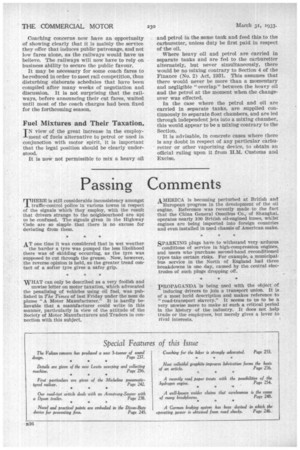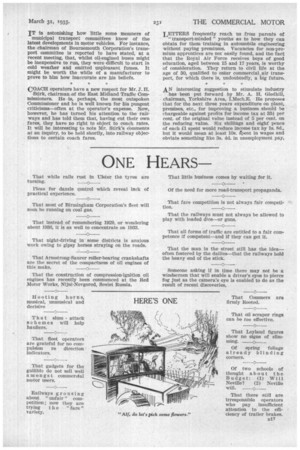Passing Comments
Page 30

Page 31

If you've noticed an error in this article please click here to report it so we can fix it.
THERE is still considerable inconsistency amongst traffic-control police in various towns in respect of the signals which they employ, with the result that drivers strange tothe neighbourhood are apt to be confused. The signals given in the Highway Code are so simple that there is no excuse for deviating from them.
AT one time it was considered that in wet weather
the harder a tyre was pumped the less likelihood there was of skidding occurring, as the tyre was supposed to cut through the grease. Now, however, the reverse opinion is held, as the greater tread contact of a softer tyre gives a safer grip.
WHAT can only be described as a very foolish and
unwise letter on motor taxation, which advocated the penalizing of vehicles using oil fuel, was published in The Times of last Friday under the nom de plume "A Motor Manufacturer." It is hardly believable that a manufacturer could write in this manner, particularly in view of the attitude of the Society of Motor Manufacturers and Traders in connection with this subject.
AMERICA is becoming perturbed at British and European progress in the development of the oil engine. Reference was recently made to the fact that the China General Omnibus Co., of Shanghai, operates nearly 100 British oil-engined buses, whilst engines are being imported into foreign countries and even installed in used chassis of American make.
SPARKING plugs have to withstand very arduous conditions of service in high-compression engines, and users who purchase second-hand reconditioned types take certain risks. For example, a municipalbus service in the North of England had three breakdowns in one day, caused by the central electrodes of such plugs dropping off.
pROPAGANDA 'is being used with the object of inducing drivers to join a transport union. It is of a most lurid description and makes reference to " road-transport slavery." It seems to us to be a very unwise move to make at such a critical period in the history of the industry. It does not help trade or the employees, but merely gives a lever to rival interests. IT Is astonishing how little some memners of municipal transport committees know of the latest developments in motor vehicles. For instance, the chairman of Bournemouth Corporation's transport committee is reported to have stated, at a recent meeting, that, whilst oil-engined buses might be inexpensive to run, they were difficult to start in cold weather and emitted unpleasant fumes. It might be worth the while of a manufacturer to prove to him how inaccurate are his beliefs.
COACH operators have a new respect for Mr. J. IL • Stirk, chairman of the East Midland Traffic Commissioners. He .is, perhaps, the most outspoken Commissioner and he is well known for his pungent criticisms—often at the operator's expense. Now, however, he has turned his attention to the railways and has told them that, having cut their own fares, they have no right to object to coach rates. It will be interesting to note Mr. Stirk's cbmments at an inquiry, to be held shortly, into railway objections to certain coach fares. LETTERS frequently reach us from parents of " transport-minded" youths as to how they can obtain for them training in automobile engineering without paying premiums. Vacancies for non-preraium apprentices are not easily found, and the fact that the Royal Air Force receives boys of good education, aged between 15 and 17 years, is worthy of consideration. They return to civil life at the age of 30, qualified to enter commercial air transport, for which there is, undoubtedly, a big future.
AN interesting suggestion to stimulate industry has been put forward by Mr. A. H. Gledhill, chairman, Yorkshire Area, LMech.E. He proposes that for the next three years expenditure on plant, premises, etc., for improving a business should be chargeable against profits for income tax at 33i per cent, of the original value instead of 5 per cent. on the reducing value. Six shillings and eight pence of each £1 spent would reduce income tax by 1s. 8d., but it would mean at least 10s. gpent in wages and obviate something like 3s. 4d. in unemployment pay.




























































































